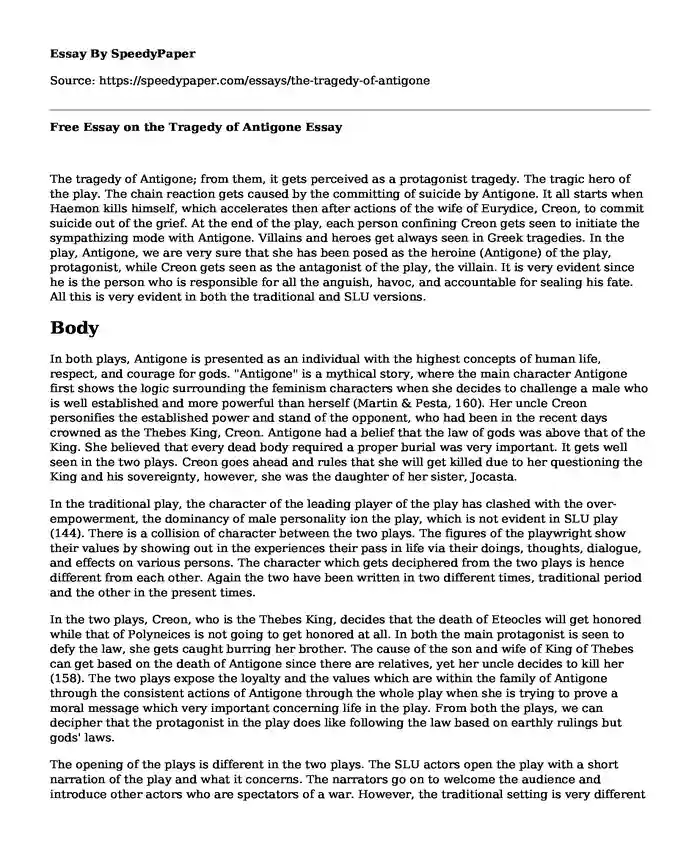
| Type of paper: | Essay |
| Categories: | Character analysis Antigone |
| Pages: | 3 |
| Wordcount: | 784 words |
The tragedy of Antigone; from them, it gets perceived as a protagonist tragedy. The tragic hero of the play. The chain reaction gets caused by the committing of suicide by Antigone. It all starts when Haemon kills himself, which accelerates then after actions of the wife of Eurydice, Creon, to commit suicide out of the grief. At the end of the play, each person confining Creon gets seen to initiate the sympathizing mode with Antigone. Villains and heroes get always seen in Greek tragedies. In the play, Antigone, we are very sure that she has been posed as the heroine (Antigone) of the play, protagonist, while Creon gets seen as the antagonist of the play, the villain. It is very evident since he is the person who is responsible for all the anguish, havoc, and accountable for sealing his fate. All this is very evident in both the traditional and SLU versions.
Body
In both plays, Antigone is presented as an individual with the highest concepts of human life, respect, and courage for gods. "Antigone" is a mythical story, where the main character Antigone first shows the logic surrounding the feminism characters when she decides to challenge a male who is well established and more powerful than herself (Martin & Pesta, 160). Her uncle Creon personifies the established power and stand of the opponent, who had been in the recent days crowned as the Thebes King, Creon. Antigone had a belief that the law of gods was above that of the King. She believed that every dead body required a proper burial was very important. It gets well seen in the two plays. Creon goes ahead and rules that she will get killed due to her questioning the King and his sovereignty, however, she was the daughter of her sister, Jocasta.
In the traditional play, the character of the leading player of the play has clashed with the over-empowerment, the dominancy of male personality ion the play, which is not evident in SLU play (144). There is a collision of character between the two plays. The figures of the playwright show their values by showing out in the experiences their pass in life via their doings, thoughts, dialogue, and effects on various persons. The character which gets deciphered from the two plays is hence different from each other. Again the two have been written in two different times, traditional period and the other in the present times.
In the two plays, Creon, who is the Thebes King, decides that the death of Eteocles will get honored while that of Polyneices is not going to get honored at all. In both the main protagonist is seen to defy the law, she gets caught burring her brother. The cause of the son and wife of King of Thebes can get based on the death of Antigone since there are relatives, yet her uncle decides to kill her (158). The two plays expose the loyalty and the values which are within the family of Antigone through the consistent actions of Antigone through the whole play when she is trying to prove a moral message which very important concerning life in the play. From both the plays, we can decipher that the protagonist in the play does like following the law based on earthly rulings but gods' laws.
The opening of the plays is different in the two plays. The SLU actors open the play with a short narration of the play and what it concerns. The narrators go on to welcome the audience and introduce other actors who are spectators of a war. However, the traditional setting is very different from the SLU play. The play starts with the two sisters chatting, and it is an excellent introduction; yet, very different from the SLU play. The SLU play is based on the narration and not the action of the actors, while the traditional acting involves visual movements that the audience can decipher well. The two, however, have some differences, but they are talking about the same scenes. The scenes which get described in the SLU's play are the same ones that get played in the traditional play. These factors make both to be the same as they are acted from the play, "Antigone."
Conclusion
The two plays have many similarities in common. However, they still have some differences within them. The essay has brought out both the similarities and differences in a more profound manner. Through the plays, one can observe the similarities and differences in a more precise way.
Work Cited
Martin, T. L., & Pesta, D. (2016). "All for Love, and Nothing for Reward,": Psyche from Spenser to Lacan, and the Loss of Critical Values. Ben Jonson Journal, 23(2), 143-168.
Cite this page
Free Essay on the Tragedy of Antigone. (2023, Mar 15). Retrieved from https://speedypaper.net/essays/the-tragedy-of-antigone
Request Removal
If you are the original author of this essay and no longer wish to have it published on the SpeedyPaper website, please click below to request its removal:
- Essay Sample on Location of Potential Competitors
- American Revolution Essay Example
- Should College Tuition Be Affordable, Free Essay in Education
- Classification of Movies - Essay Example
- Essay Sample on Greek Mythology: Dido Character and Framed Narrative
- Trauma and Addiction Essay Sample
- 1917 Film Analysis Essay
Popular categories




